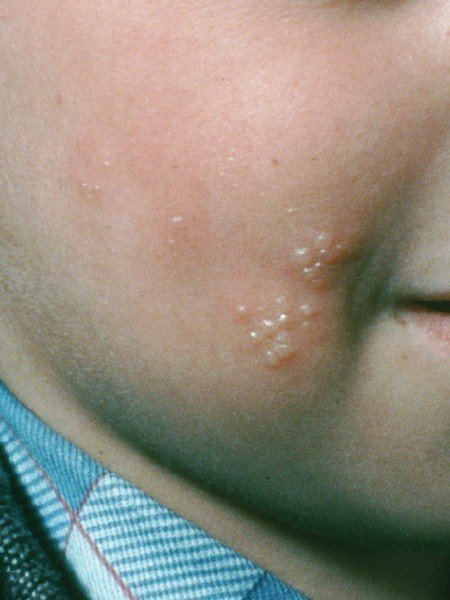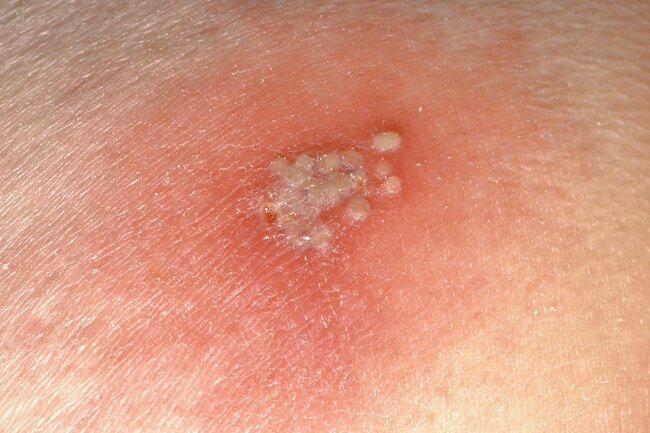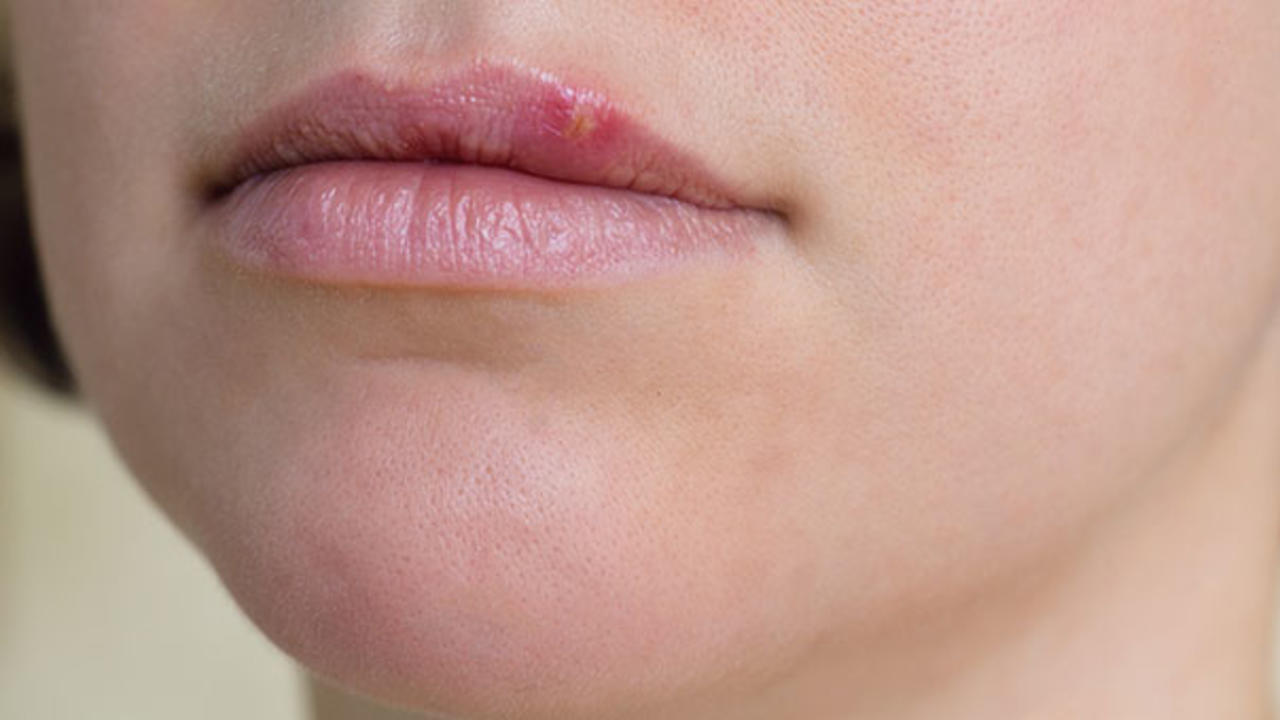Genital Herpes: Common But Misunderstood
First recognize the symptoms and signs, then take action to prevent outbreaks
Genital herpes is a sexually transmitted infection that can cause small, painful sores in the genital area. The symptoms may include low-grade fever, itching, burning, and trouble urinating. But many people with the disease dont realize they have been infected with HSV, because either they have only mild or infrequent symptoms, or no symptoms at all. In women, herpes outbreaks can also be mistaken for vaginitis, urinary tract infections, or even hemorrhoids.
To continue reading this article, you must log in.
- Research health conditions
You May Like: Can You Get Rid Of Herpes
If You Have Genital Herpes Already Can It Be Spread To Other Parts Of The Body Such As The Arms Or Legs
No. Genital herpes cannot be transmitted to another part of your body such as your arm, leg or hand after the first infection occurs. If you have genital HSV II, you will not get HSV II at another site in your body. The immune system produces antibodies that protect other parts of your body from infection. However, there are cases where a person has multiple site infections from the same virus. This is usually acquired at the time of the first infection. For example, if someone has never had herpes but then has oral and genital sex with an infected partner, they can acquire the infection at both sites.
What Is Neonatal Herpes
Neonatal herpes can be a very serious infection. Babies generally contract the virus from their birthing parent during childbirth even if the parent doesnt have active lesions. They may also get HSV-1 if an adult with an active cold sore kisses them. Breastfeeding babies can also get HSV-1 from the breast if there are lesions present. But babies cant get herpes from breast milk, so its safe to pump and feed.
Herpes simplex can be more dangerous for young babies because they dont have a fully developed immune system. But most babies with neonatal herpes can recover fully with treatment.
The dangers of neonatal herpes are much higher if the infection spreads to the babys organs. If youre pregnant and have herpes, speak with your healthcare provider about how to lower the risk of passing the infection to your baby.
Also Check: How Long Can You Have Herpes And Not Know
There Are Ways To Keep Your Partner Healthy
âThe most important thing is to talk to your partner,â says Dr. Loanzon. âSpeaking about sexual history is really important. A lot of us get very fearful when speaking about sex. As an OBGYN and as a person who is herpes-positive, I think it is really important to talk to your partner before and say, âI wanna make sure you are OK with this because I donât want to jeopardize your health.’â
The next steps that you should take to keep you and your partner healthy include the use of condoms and medication. Condoms can really help with prevention â but Dr. Loanzon explains that they are only 96 percent effective, not 100 percent. She says, âThe herpetic virus can infect other areas, so even if you are using condoms, there is still some skin exposure. The fluid from the ulcer can infect other areas.â Medication for daily suppression, Dr. Loanzon explains, can make a huge difference. âIf you are herpes-positive, using daily suppression can help decrease your risk of transmission to your partner. And that is daily dosing of an antiviral mediation, which can help decrease viral shedding significantly so that your partner wont end up being exposed.â
Scheduling Appointments For Herpes Treatment And Genital Herpes Hsv

If you have any questions about testing or treatment for sexually transmitted infections , to schedule a consultation, pleasecontact us or call/text: .
We have excellent reviews from patients and their partners.
We offer affordable, highest-quality urology care with or without insurance. Find out our office hours or directions to our office. We offer weekday, weekend, and evening office hours.
You May Like: How To Test For Herpes 1 And 2
Your Vitamin D Deficiency
VitaminD is important for herpes treatment and prevention.It helps your body to absorb nutrients. Without it, you may develop softer andweaker skin. Lack of vitamin D can make you more vulnerable to viralinfections. In the case of herpes , that could mean more frequentoutbreaks. The lower your vitamin D levels are, the worse your herpes outbreaksare. In those cases, the symptoms will last longer and heal more slowly.
Outbreaks For Asymptomatic Hsv
The majority of herpes infections, of both HSV-1 and HSV-2, are asymptomatic. This means that you can be infected with the herpes virus and have viral DNA in your body without any visible symptoms.
People with asymptomatic herpes can still spread the virus to others while not having any cold sores or genital herpes lesions.
Sometimes, people with asymptomatic herpes might experience an initial outbreak of cold sores or genital herpes, only to have the virus disappear after the first outbreak. In this case, herpes is still present in the body, but simply remains inactive and doesnt produce further outbreaks.
It can be difficult to know whether or not you have asymptomatic HSV-1 or HSV-2, or simply have infrequent herpes outbreaks. However, if youre confident you have herpes but havent had an outbreak for several years, its likely that you have an asymptomatic infection.
Even if youre asymptomatic, its still important to take precautions against spreading herpes to other people. Herpes remains in the body even if you dont have any symptoms, and there is a risk that you could spread the virus through kissing, oral sex or other sexual activity.
If you have asymptomatic herpes, the best approach is to speak to your doctor about treatment options and the use of suppressive therapy to reduce your risk of infecting others.
Recommended Reading: What Should I Do If I Think I Have Herpes
What Happens If I Dont Get Treated
Genital herpes can cause painful genital sores and can be severe in people with suppressed immune systems.
If you touch your sores or the fluids from the sores, you may transfer herpes to another part of your body, such as your eyes. Do not touch the sores or fluids to avoid spreading herpes to another part of your body. If you do touch the sores or fluids, immediately wash your hands thoroughly to help avoid spreading your infection.
If you are pregnant, there can be problems for you and your developing fetus, or newborn baby. See Im pregnant. How could genital herpes affect my baby? above for information about this.
How Often Can Genital Herpes Come Back
Some people get no further episodes, while a few get frequent recurrences. If you do, you could ask your doctor for antiviral pills to prevent outbreaks see antiviral treatment, or you can try self-help treatments. There are two pages of suggestions on our Tips to prevent recurrences leaflet. It is available to members. Outbreaks normally decline in frequency and severity over time.
Don’t Miss: How Do They Check For Herpes
What Does Genital Herpes Look Like
While some people with genital herpes will never have any symptoms, other people can develop symptoms within a few weeks of being infected.
Often, before the lesions appear, patients describe a prodrome, characterized by a tingling or burning sensation in the area where the lesions will develop that can be noticed during urination, along with itching or discomfort in the genital area.
You can also have the following symptoms:
- Blisters on the mouth or lips
- Fever, headache or pain in the joints
- Trouble urinating
The symptoms of genital herpes often go away and come back as recurring outbreaks. For most people, the first outbreak is the worst, and can last from two to three weeks. Future flare-ups are often less severe and do not last as long. Still, some people shed the virus regularly. The following triggers can make outbreaks more likely to occur:
- Viral or bacterial infections
- Menstrual periods
Recurrent genital herpes is most common in the first year after the initial infection and decreases as time goes on.
In many cases, anti-herpes medicine can help patients. When a person experiences a prodrome and suspects a recurrence is going to happen, they begin taking anti-herpes medications that lessen symptoms and shorten the time of the outbreak.
Why You Get Herpes Outbreaks During Your Period
When I was diagnosed with herpes six years ago, it was a little bit of a shock. Not because I had herpes the Centers for Disease Control estimates that 1 in 6 people between the ages of 14 and 49 in the U.S. have genital herpes, and the World Health Organization released a study in 2015 that estimates two-thirds of people in the world have the HSV-1 strain of the virus but because my symptoms didnt look anything like the scary pictures they showed us in sex ed. I didnt have an array of oozing blisters and my vulva didnt look like something out of a horror movie. Instead, it took months to see a doctor because I didnt associate achy skin on my thighs and butt and tingling in my vulva with herpes.
But after several months of nerve pain that was so bad it hurt to wear pants and quad muscles so sore that sometimes my legs gave out and what I thought was a recurring ingrown hair that itched a lot, I walked into Planned Parenthood and asked them to swab the lesion to see if it was herpes. But it had already scabbed over, making a swab test impossible. However, a blood test quickly confirmed what I was starting to suspect: I had HSV-2, or genital herpes. That day I also found out that the other super weird symptoms I was experiencing the tingling and the achy skin and the sore quadriceps were also a result of herpes.
Also Check: Can You Treat Herpes At Home
How Is Herpes Simplex Treated
Some people have few to no herpes outbreaks and choose not to have treatment. But many people prefer to use medications that shorten outbreaks and reduce symptoms.
During an outbreak, you may use an antiviral ointment or cream to help lessen your symptoms and help them go away faster, but it only works if you start it soon after you start an outbreak. Many people with HSV-2 take daily oral medications to keep outbreaks at bay.
Your provider may prescribe a topical medication or oral medication such as:
Why Do Herpes Outbreaks Come And Go Or Never Appear At All

Once you get the herpes simplex virus, it never leaves the body.
Your first outbreak is often the worst. The body does not have antibodies to fight the virus, and the signs and symptoms tend to be more severe. After the first outbreak, also called the primary outbreak, your signs and symptoms tend to be milder.
However, not all primary outbreaks are severe. Some are so mild that a person does not even notice.
After the first outbreak, the virus moves from the skin cells to nerve cells. There the virus remains dormant. Some people never have another outbreak. Others have recurrences, which are generally more common during the first year.
Over time, the outbreaks tend to become less frequent and milder as the body develops antibodies to the virus. For some people, the outbreaks never stop.
A recurrence may be triggered by stress, illness, fever, sun exposure, menstruation, or even a surgery. If sun exposure is a trigger, wearing sunscreen and a lip balm with sun protection can help. Look for broad-spectrum sunscreen and lip balm with a Sun Protection Factor of 30 or higher.
Also Check: How Do Herpes Look On Your Lip
Recurrent Episodes Of Genital Herpes
Recurrences are usually less painful and shorter in duration than the first episode of genital herpes. Over time, episodes usually become less frequent and may eventually stop altogether. Infections caused by HSV1 are less likely to recur in the genital area than infections caused by HSV2.
Recurrences may be triggered by:
How Long Do Herpes Outbreaks Last
Herpes is a sexually transmitted infection. It has two known types: herpes simplex virus type 1 and herpes simplex virus type 2 .
Genital herpes outbreaks are normally caused by the type 2 virus while the type 1 virus typically manifests itself as cold sores around the mouth and lips. However, HSV-1 can also manifest in the form of genital herpes if there are oral to genital contact.
Also Check: Why Do You Get Herpes Outbreaks
Recognizing The Signs: The Prodrome
Early in the phase of reactivation , many people experience an itching, tingling, or painful feeling in the area where their recurrent lesions will develop. This sort of warning symptomcalled a prodromeoften comes a day or two before lesions appear. To be on the safe side, its best to assume virus is active during these times.
Recurrence Course Triggers And Timing
Course of Recurrence
Most cases of herpes simplex recur. The site on the body and the type of virus influence how often it comes back. Recurrences of genital herpes are more likely with HSV-2 infection than with HSV-1 infection.
The virus usually takes the following course:
- Prodrome. The outbreak of infection is often preceded by a prodrome, an early group of symptoms that may include itchy skin, pain, or an abnormal tingling sensation at the site of infection. Headache, enlarged lymph glands, and flu-like symptoms may occur. The prodrome, which may last from 2 hours to 2 days, stops when the blisters develop. About 25% of the time, recurrence does not go beyond the prodrome stage.
- Outbreak. Recurrent outbreaks feature most of the same symptoms at the same sites as the primary attack, but they tend to be milder and briefer. After blisters erupt, they typically heal in 6 to 10 days. Occasionally, the symptoms may not resemble those of the primary episode, but appear as fissures and scrapes in the skin or as general inflammation around the affected area.
Triggers of Recurrence
Herpes outbreaks can be triggered by different factors. They include sunlight, wind, fever, physical injury, surgery, menstruation, suppression of the immune system, and emotional stress. Oral herpes can be triggered within about 3 days of intense dental work, particularly root canal or tooth extraction.
Timing of Recurrences
Don’t Miss: Can Herpes Be Treated Naturally
Recognize The Early Symptoms
You might not be able to stop an outbreak, but you might be able to reduce the severity and length of it. Many people have warning signs of an outbreak, including itching, tingling, genital pain, or shooting pain in the legs, hips, or buttocks, according to the Centers for Disease Control and Prevention . These signs can occur hours or days before the outbreak, so knowing them gives you the chance to treat the outbreak before it happens.
Dont Miss: How Many People Have Herpes
Why Do I Keep Getting Cold Sores
If youve ever patiently nursed a pesky cold sore back to health just to have it pop up again in a few weeks, you understand the pain of recurring cold sores. But why does this happen? Why can a person keep getting cold sores one after another? Below, well investigate the reason behind the phenomenon of recurring cold sores and give you some tips and tricks on how to avoid spreading the virus.
Read Also: How To Get Rid Of Herpes Simplex On Lips
Recommended Reading: How Often Does Genital Herpes Flare Up
Editorial Sources And Fact
Also Check: How To Treat Herpes On Your Lip
What Is A Herpes Outbreak

A herpes outbreak happens when lesions called blisters or sores start to form on your genitals, bottom or mouth. If you have oral sex, you can also get oral herpes in the mouth. Your first outbreak of genital herpes will generally last longer with more severe symptoms, such as a fever or muscle aches.
Recurrent infections happen because the virus stays dormant in your body. Once triggered, the virus reactivates which leads to an outbreak. Triggers for recurrent infections can include being stressed, being on your period or feeling run down.
You might have an outbreak of herpes a long time after youve had unprotected sex. The virus can stay in your body and not cause symptoms straight away.
Also Check: How To Avoid Herpes Outbreaks
Read Also: How Do You Contract Herpes Std
How Can I Reduce My Risk Of Herpes Simplex
Preventing HSV-1
You can reduce your risk of contracting HSV-1 by avoiding physical contact with someone who has a cold sore. People can still spread HSV-1 when cold sores arent present, but its less likely.
If someone has an active HSV-1 infection, avoid:
- Sharing utensils, cups, lip balms or other personal care products.
- Touching the skin near their mouth.
Preventing HSV-2
If youre sexually active, you can take these steps to protect yourself and others from the herpes virus and other STIs:
- Be monogamous with one sexual partner or limit your number of partners.
- Get tested for STIs and complete any prescribed treatment.
- Tell your sexual partners if you have genital herpes so they can get tested.
- Use condoms during intercourse and dental dams during oral sex.
Wash your hands often if you have an outbreak or are around someone with symptoms.
If your sexual partner has genital herpes, these actions can lower your risk of getting the virus:
- Dont have sex when your partner has active symptoms. Condoms may not cover all sores, so you may still get the virus.
- Make sure your partner takes antiviral medication as prescribed.
- Wait to have sex until scabs fall off active lesions.